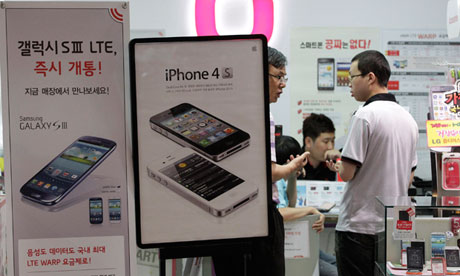What Apple's victory over Samsung means
US firm may now go after Motorola and HTC, while Android considered likely to continue to dominate smartphone market

Despite Apple's victory over Samsung in the patent trial, Android is expected to keep control of the global smartphone market. Photograph: Ahn Young-Joon/AP
For Tim Cook, Apple's chief executive, who took over from Steve Jobs a year ago, the court victory over Samsung will have been sweet. Normally, patent disputes rarely produce clean victories. But the decision by the nine-member jury in San Jose, just a few miles from Apple's headquarters, is dramatic.
Apple had been suing Samsung for $2.5bn in damages, claiming Samsung's phones and tablets copied its devices' behaviour and appearance; Samsung counter-claimed about $200m, saying the iPhoneand iPad used its wireless 3G standard technologies, and methods for tasks such as sending a photo by email from a phone.
Apple won on almost every count it claimed; Samsung, on absolutely none. It was a dramatic demonstration of the home court advantage. Samsung Electronics can bear the $1.05bn in damages – in the second quarter of this year alone its operating profit was $5.86bn – but the hit to its reputation is substantial. Apple can portray it as a looter of intellectual property, a copyist, an unimaginative follower.
Apple can also now go after HTC and Motorola, its two principal smartphone rivals in the US, with renewed vigour. They may have to consider whether to sue for peace, for Samsung lost despite being the biggest of the mobile makers, the biggest smartphone maker, the biggest implementer of Google's Android mobile software, and extremely rich — it spent $9.5bn on market in the past 12 months, and is a major sponsor of the Olympics.
More than that, though, Apple will hope that this decision will put second thoughts and self-doubt into the minds of every industrial designer and software engineer competing in the smartphone and tablet business around the world.
Apple's key rival here is Google, whose Android software Samsung used to build its phones. But Apple can only go after the handset makers that implement Android, not the creators themselves; even so, by winning on Friday, it will have nervous engineers at the handset makers, who are using Android in ever-growing numbers, pausing as they compare their latest products with the next iPhone. Is it too similar? Will this trigger a lawsuit? Should I change it?
The patent wars have dismayed many, who find the legal fighting tedious, and wish the companies would just work on innovation. Apple, for its part, insists that it is happy with competition — but that rivals should do their own innovation. The rivals shoot back that Apple is trying to patent ideas that have been obvious and implemented before.
Despite this result, Android is likely to keep winning the battle to run the world's smartphones; it ran on 64% of the smartphones shipped worldwide in spring, and 80% of the smartphone shipped in China in that period; the iPhone had 12%. Android is running on phones that are getting cheaper and cheaper all the time. It wouldn't be worth Apple's time to sue every company using it.
But in the US, where its most valuable customers are, Apple definitely sees the effort as worth going to. The decision in San Jose may be the first of many. The question now is whether Google, whose Motorola subsidiary a week ago filed a fresh series of patent infringement claims against Apple — claims which could halt sales of the iPhone and iPad, if upheld — can manage to drive the war to a settlement. So far, there's no sign of that happening. And Apple is yet another billion dollars richer.
its my first comment on your blog and i am glad to comment on your post i loved what u share thanks for sharing its very useful info. for my website SEO
ReplyDeletePackers and Movers Mumbai
Packers And Movers Akola Maharashtra
ReplyDeletePackers And Movers Mumbai to Ahmedabad
<